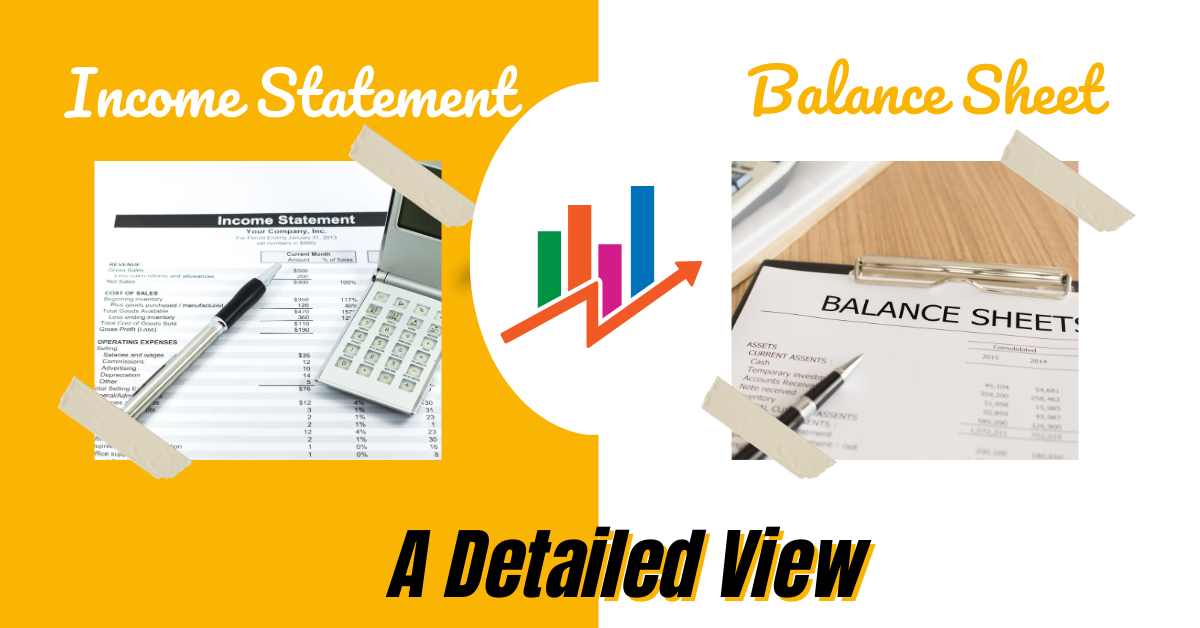Businesses try their level best to perform well. Though they keep an eye on their progress, it is important to have the profits, assets, liabilities, and other financial in and outflows documented properly. After all, verbal assurance does not work. When investors decide on whether to invest in a particular venture, it is the credentials or document they go through to build trust. This is what makes various financial statements necessary to be prepared. Two of the most important of all are the income statement and balance sheet.
Though both of them notify the information seekers about the growth of a business, there are a few points that clearly state how they differ in multiple aspects. This article is about a detailed study of income statements vs balance sheets. However, before diving into the deeper concepts, let us understand these statements individually.
What is an income statement?
As the name implies, an income statement is a financial statement that tells the company and its stakeholders about the income generated within a specific period, be it monthly, quarterly, or monthly. It is also known as the Profit and Loss (P/L) statement as it indicates the profits reaped or losses incurred for that period.
This statement also includes the costs and expenses incurred in generating this revenue. Such expenses include taxes, operating costs, and Cost of Goods Sale (COGS). You can make necessary deductions and derive the exact income made by the venture for that specific period. The major elements of this statement are sales revenue, realized gains and losses, related expenses, and net income made or loss incurred.
The income generated indicates whether the business has made profits or is getting into a loss. Accordingly, businesses make strategic decisions, and investors decide whether to invest in them.
What is a balance sheet?
With the balance sheet, it’s a tally game. Instead of focusing on the profits and losses a business makes, this financial statement emphasizes the assets, liabilities, and shareholders’ equity and records them at the end of the accounting period. Tallying the balance sheet works on the following expression:
Assets = Liabilities + Shareholders’ Equity
What the businesses own is an asset and what it owed is the liability. Assets include cash or cash equivalent, inventory, accounts receivable, plant or intellectual property, etc., whereas liabilities include financial obligations, like debt, accounts payable, etc. The shareholders’ equity, which is the third component of this financial statement, signifies the total assets that are to be attributed to the shareholders after all financial obligations are met.
Hence, the balance sheet does not let the stakeholders or businesses have a clear view of the profits made or losses incurred, but it helps them decide whether to invest in the venture, depending on the assets-liability balance.
Accounting Done Right Following Compliances

Income Statement vs Balance Sheet
Though the structure, components, and method of accounting for finances differ in both cases, the income statement and balance sheet share the same objective of helping businesses and investors make appropriate decisions by letting them have a clear look at how the business is progressing.
1. Similarities
Before checking out the differences, let us have a look at some of the similarities they share:
2. Double-Entry Accounting
Both the income statement and balance sheet follow double-entry accounting. This means that two accounts get affected simultaneously whenever an entry is made. This means while one account is debited, another gets credited.
3. Affects Loan Applications
As the income statement and balance sheet help readers analyze the actual position of the company currently, it influences lenders’ decision of whether to approve a loan for that business or not.
4. Need Following Regulations
Multiple regulatory guidelines must be consider while preparing both these statements. If not compliant, they become void.
5. Differences
Now that you are aware of how similar these two financial statements are, it’s time to explore the differences between them:
6. Validity
While the balance sheet needs to be prepare at frequent intervals, the income statement is valid for the long term, which is at least from one financial year to another or even more. As a result, for one fiscal year, a business can have multiple balance sheets prepared monthly or quarterly, but the income statement remains the same for two to three years.
7. Monitoring
As the income statement is infrequent, while the balance sheet is more frequently prepare, the performance monitoring process is different. The frequency makes the balance sheet the best for short-term tracking of a business’s performance, while the latter is ideal for making long-term predictions using long-term results. The current aspects are well analyzed using balance sheets, while the long-term aspects to be studied and analyzed require an income statement.
8. Documentation
It is an important factor as the components reported in both financial statements are different, given their tax objectives per the Internal Revenue Service (IRS). The balance sheet has sales and use taxes mentioned as major elements, while the income statement is wider in that sense. They report sales revenue, realized gains/losses, and tax-related entries. Income tax liabilities are clearly visible on the income statement.
Final Thoughts
After going through the income statement vs balance sheet detailed study, you can say that though the ways in which the two statements list the financial elements are different, they aim at one and the same thing, i.e., providing clarity of finances to the readers. While one mentions the profits made or losses incurred for a specific period, the other provides a clear-cut view of how many assets businesses possess and how much liability they are shouldering.
If according to the income statement, the company is making losses, the businesses decide to improve and if it seems to reap profits, the company knows it is on the right track. On the other hand, if the balance sheet shows unreliability with records not tallying properly, it raises doubts among investors, who might drop the idea of investing in the business.
Thus, ensuring accuracy in preparing these financial statements is a must, given the role they play in establishing trustworthiness among the information readers.
Your income statement and balance sheet need no special concern when you have our professionals on board. Our experts know very well how to track your finances to make the data useful for all internal and external stakeholders of the firm. With us, you will never have to bother about monitoring, managing, and maintaining your financial details. Let’s connect.







